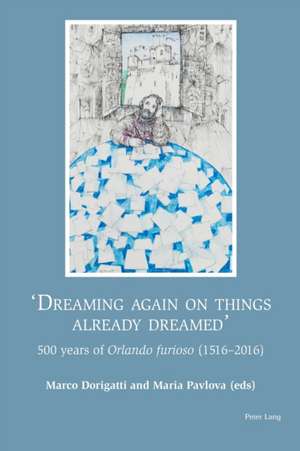«Dreaming again on things already dreamed»
en Limba Engleză Paperback – 20 mar 2019
The Argentinian poet Jorge Luis Borges, whose visionary poem Ariosto y los rabes inspired the title of this book, defined Ariosto's Orlando furioso as a dream: a dream that grew out of the medieval legends of Charlemagne and King Arthur to conquer the entire western world and become a collective fantasy, a mirror onto which for centuries countless readers have reflected their own dreams and aspirations. That dream reached its 500th anniversary in 2016 and, to mark the occasion, a group of 14 scholars, comprising internationally acclaimed specialists as well as younger researchers, came together in Oxford to reflect on Ariosto in what would turn out to be a memorable meeting of minds. This book contains their thoughts and ideas, and above all their dialogue, offering fresh perspectives on one of the most enigmatic works of European, and - increasingly - world literature. Divided into three parts (Tradition; Interpretation; Reception), it aims to establish what Ariosto's poem was in its own time, at key stages during its five-century history, and of course what it means today. In revisiting Ariosto's dream, it tries to answer the question: is it still alive?
Preț: 551.95 lei
Nou
105.62€ • 110.55$ • 87.91£
Carte tipărită la comandă
Livrare economică 31 martie-14 aprilie
Specificații
ISBN-10: 178707899X
Pagini: 376
Dimensiuni: 150 x 225 x 20 mm
Greutate: 1.02 kg
Editura: Peter Lang Copyright AG
Notă biografică
Maria Pavlova obtained her doctorate from the University of Oxford in 2015, and then held a Joanna Randall MacIver Junior Research Fellowship at St Hugh's College. In 2018 she joined the University of Warwick as a Leverhulme Early Career Fellow. Her main research interests lie in late medieval and Renaissance Italian literature, especially the chivalric genre. Her forthcoming monograph, Saracens and their World in Boiardo and Ariosto, investigates the multi-faceted figure of the religious Other in Boiardo's I n amoramento de Orlando, Ariosto's Orlando furioso, and more generally in the literature and culture of the Italian Renaissance.
